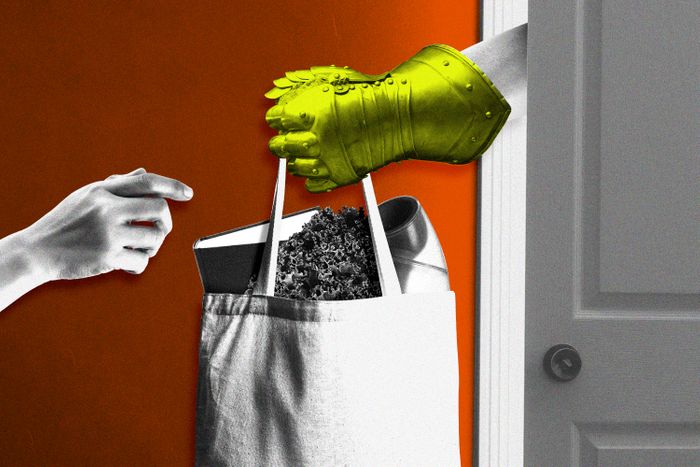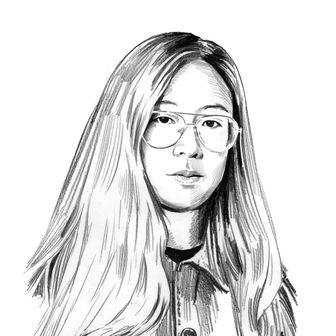
In mid-January, the Buy Nothing group in Milton, Washington, interrupted its usual feed of free baby onesies and old desk chairs with an abrupt announcement. The group, wrote admin Mari Pepping, would “no longer be associated” with the Buy Nothing Project, the official name for the Facebook-born, neighborhood-specific online communities that trade gently used stuff among themselves. “Those of us who admin do it for the love of our community and our neighbors,” Pepping wrote of the volunteer members who screen posts and moderate groups, but Buy Nothing’s “core values” had changed in recent years: strict neighborhood boundaries, once a central tenet, were suddenly up for debate; the founders had even formed a public benefit corporation, tried to move operations onto a proprietary app, and trademarked their name. The post went on to claim that this newly professionalized Buy Nothing would shut down or “take over” local groups that failed to follow these new principles. Buy Nothing Milton would now be called, rather pointedly, Gifting With Integrity Milton (North). “Groups are getting shut down,” Pepping told me on a recent call about the existential crisis playing out in a once harmonious space for finding an Ikea Kallax. “I feel like they called all-out war.”
“They,” in this case, are co-founders Rebecca Rockefeller and Liesl Clark, who in 2013 started the Buy Nothing Project as a 300-member Facebook group about an hour’s drive northwest on Bainbridge Island. In early press, Clark often cited as inspiration the time she spent in villages in Nepal that operated on gift economies. (“Your money is no good there,” she told the Seattle Times in 2017.) There are now 6.5 million members spread across multiple continents and 7,500 groups. In its ten years of existence, Rockefeller and Clark have always maintained that Buy Nothing was about more than just free stuff; the used mattress was a means of getting to know your neighbors and build lasting connections and provide an escape from an economy of disposability. They believed in the project, putting countless hours of unpaid work into seeing it grow. It was a well-cultivated image of political intention and do-gooderness that came to function, over time, as a grenade among its members.
Multiple people I spoke to seem to agree that the real fractures in Buy Nothing started to show in 2018. A Buy Nothing group in Jamaica Plain, Massachusetts, that had grown to 5,000 members had become an issue, at least according to rules requiring groups larger than 1,000 members to “sprout” or split into smaller subgroups to protect the hyperlocal nature of Buy Nothing. (Buy Nothing’s long list of rules lives in a document admins refer to as the “Fine Print.”) Members protested, pointing to the fact that Jamaica Plain was a heavily segregated neighborhood, divided among a more recent wave of wealthy, mostly white professionals and the neighborhood’s long-standing working-class and low-income Black and Latino residents. They didn’t want Buy Nothing’s own neighborhood mapping to mirror the area’s historic redlining. Buy Nothing leadership along with co-founders Clark and Rockefeller, who are both white, tried to push ahead anyway.
The backlash was immediate. People accused the founders of “Columbusing” and regional admins of deleting posts from people of color. A member described Buy Nothing, ominously, as “controlled by a wealthy white woman in Washington state.” In one attempt at addressing member concerns, Buy Nothing leadership posted a message that included a photo of a bunch of white hands together in a circle, which further inflamed the situation. Members across the Buy Nothing community also described experiencing racism and other kinds of bias in their day to day in the groups. Some argued that many of Buy Nothing’s rules — enforced “civility” and the hierarchical model of admins — were reinforcing racist and classist dominance in a space that was supposed to be about community and mutual support.
In response, Clark and Rockefeller entered a listening and learning period. They formed an equity team. They moved away from strict group boundaries in what they saw as an effort to not reinforce neighborhood segregation. They revised the “one group” rule that some admins were using to exclude people who were maybe transient or had unstable housing. They started to allow “tip jars” for admins so that people could be compensated for their time if they didn’t have the means to volunteer. (Some admins told me they were spending up to 40 hours a week managing and moderating their local groups.) “Thanks to the many people who spoke up, called us out and in, and invested their labor in us,” the founders wrote in a post explaining these changes, “we were able to see our own white fragility and internalized racism in new ways.”
Even the smallest of rules was carefully reexamined: They wrote a long explanation about why their original guideline to avoid abbreviations like “ISO” (in search of) was actually “elitist and ableist” since they might be easier to use for those “who have difficulty typing, who are developmentally challenged, who use digital readers because they’re visually impaired.” By the end of 2020, Rockefeller and Clark removed themselves from all Buy Nothing groups and posted training resources under a Creative Commons, open-source model, allowing local admins the autonomy they wanted. More changes were rolled out in the years that followed: The founders, who wanted to divest from Facebook, also created a Buy Nothing app that allowed users to exchange items without needing to abide by neighborhood boundaries or relying on admins. They formed a public benefit corporation, moving away from the so-called passion project of Buy Nothing and into an actual business. They took donations to support their work, sought other funding, and began advertising a book they wrote about Buy Nothing on their website.
Not everyone was happy. As the founders began rolling out these changes, the Buy Nothing Admin Hub — which consists of over 12,000 people — lit up. What some members and admins had seen as gatekeeping and structural bias, others saw as the line between order and mayhem. “It created chaos,” one longtime Buy Nothing admin told me of the changes: Without strict neighborhood boundaries, overlapping groups would end up at odds with each other — Buy Nothing’s own app was seen as in direct conflict with its Facebook groups. Neighbors would be competing for stuff on different platforms, and they may not even be neighbors at all since someone from, say, Forest Hills could come and collect a bed frame posted in Turtle Bay. Others took particular offense to any introduction of money, which they believed stood against the titular ethos of Buy Nothing. “MLM at its absolute finest,” one member wrote of the founders’ decision to advertise their new app and book. “Then things got uglier,” one admin told me.
Andrea Schwalb, a longtime Buy Nothing admin, and other vocal dissenters created a Facebook group called “Gifting With Integrity — OG Buy Nothing Support Team” to discuss their issues. But Schwalb and another Gifting With Integrity admin, Rachel Anderson, allege they were punished for speaking out. “One by one, we got deleted from Buy Nothing’s Admin Hub,” Anderson said. Soon after, the founders updated the language of certain rules, including one on “removal from group”: Members “who announce their intent to leave can be helped to the exit door, so to speak.” And they were. (In a comment, Buy Nothing’s founders were adamant that criticism was not grounds for removal and that removal from the Admin Hub is a step “rarely taken, and only after much discussion by the entire admin team.” However, they said, there has long been a policy that “anyone who posts a ‘hair flip’ exit will be removed.”)
Despite being cut off from Buy Nothing’s hub, Schwalb, Anderson, and others continued to run their autonomous Buy Nothing groups, which largely still called themselves Buy Nothing, for the better part of two years. They continued to use Buy Nothing’s original literature and rules, which they believed were sanctioned under the open-source model, in their separate support hub, which eventually grew to over 2,000 defector admins. For a time, things carried on more or less as normal. Buy Nothing members kept on buying nothing, including one woman in New York who scored two free granola bars from a neighbor.
But in 2021, Clark and Rockefeller filed for a trademark. Schwalb told me her splinter group tried to contest the filing, but the member-attorney who had said she’d look into it “got busy.” She added, with an air of resignation: “We weren’t paying attention when they resubmitted their documents.” Gifting With Integrity’s support group was reported by the founders and ultimately deleted by Facebook in December 2022. Schwalb and other admins say they then scrubbed other admin-training groups of any mention of Buy Nothing, with members instead using “Voldemort” or “they who shall not be named” instead. But those groups were deleted as well. The pacing felt frantic. “It’s fortunate I texted you,” Schwalb wrote to me after I had reached out on Facebook — her profile had just been deleted by Facebook. My message was one of the last she saw.
Clark and Rockefeller said their reporting was limited and targeted only to these training groups. “Other organizations can build their own training and support systems for their own local gift economy movements, but they need to do that with their own names [and] brands,” they wrote. “Claiming to be Buy Nothing training and support, then directing people to a separate website that is not part of Buy Nothing is an example of trademark infringement.”
Schwalb and Anderson have filed reports with Facebook to contest the deletion of their groups and profiles. In the meantime, they created another Gifting With Integrity support group that hasn’t been flagged — yet. While no actual local Buy Nothing groups were reported or deleted, the rumors about widespread trademark enforcement by the founders spread quickly among members and led some to change their group names in a panic. A quick scroll on Facebook reveals Gifting With Integrity groups across the country — from New York to South Carolina to California.
By all appearances, the average member has no idea anything has changed — people are still looking for high chairs and trying to give away unopened rug pads and a dozen mismatched wineglasses. If there really was a declaration of war, most haven’t noticed. Even the true believers can admit some of the divisions between the new splinter groups might be overblown. “I don’t think this chaos is going away,” one longtime Buy Nothing admin told me. “But it’s a whole lot of drama for something that’s just about connecting people and giving away and getting shit.”





